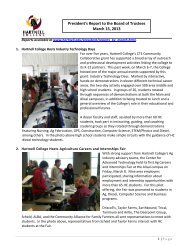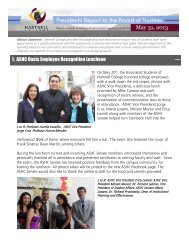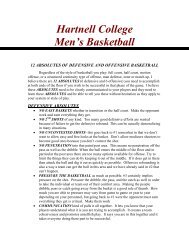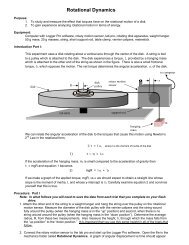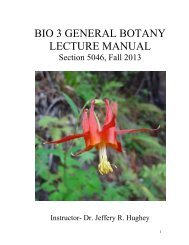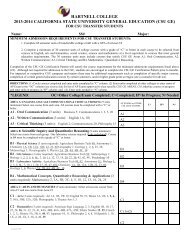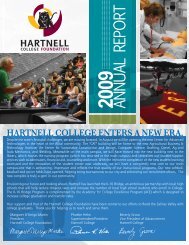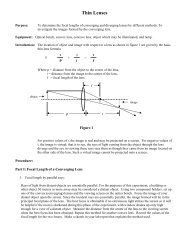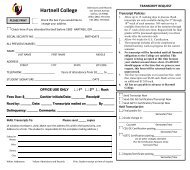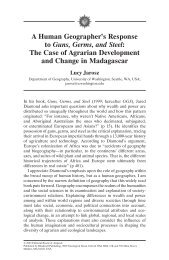hartnell college fall 2009
hartnell college fall 2009
hartnell college fall 2009
Create successful ePaper yourself
Turn your PDF publications into a flip-book with our unique Google optimized e-Paper software.
HARTNELL COLLEGE – Fall <strong>2009</strong>ATTENDANCE POLICYRegular attendance and consistent study are student responsibilities and the twofactors which contribute most to a successful <strong>college</strong> experience. A Collegestudent is expected to attend all of his/her class sessions. It is the responsibilityof each student to know the attendance and absence policy of each class inwhich he or she is enrolled.Failure to attend class can result in a lower grade or dismissal from class. Anystudent who stops attending a class without officially dropping it in theAdmissions & Records Office may receive a grade of “F.”The College’s attendance policy relies on the following five basic premises:1. Students who do not attend the first class meeting may be droppedand may be replaced by other students unless the student notifies theinstructor in advance.2. Any absence from class is detrimental to a student’s progress in thatclass; therefore, an “excused” absence is no less serious than“unexcused.” Participation in curricular and extra-curricular Collegeactivities is acknowledged to be an integral part of a student’s totaleducational experience. Prior approval from the instructor isnecessary for this participation not to be considered an absence.3. Any lack of attendance which leads an instructor to judge thatunsatisfactory progress is being made may result in the student beingdropped. Absence from a full semester class in excess of two weeks(consecutive or non-consecutive) may result in the instructor droppingthe student. That is, a student may be dropped after missing onemore class meeting than twice the number of class meetings perweek.Absences in excess of one week (consecutive or nonconsecutive)from a Summer session class, or any regularsemester class from 6-17 weeks in duration, may result in theinstructor dropping the student. That is, a student may bedropped after missing one more class meeting than thenumber of class meetings per week.Absence in excess of 10% of the scheduled class meetings inclasses from 1-5 weeks in duration may result in the instructordropping the student. That is, a student may be dropped aftermissing one more class meeting than 10% of the total numberof scheduled class meetings.4. When a student is dropped due to the attendance policy, theassignment of a “W” will be based on the drop occurring before thefourteenth week for a full semester class. After the fourteenth week,no drops are allowed, and the only grades given will be A, B, C, D, F,NC, CR. It is the student’s responsibility to withdraw formallyfrom classes by the last day to withdraw with a “W.” Anystudent who stops attending a class without officially dropping it in theAdmissions & Records Office may receive a grade of “F.”5. If the student has been dropped due to the attendance policy, theinstructor may reinstate the student only if all of the followingconditions are met:a. the student had been doing satisfactory work,b. in the judgment of the instructor, the student has areasonable chance of passing the course, andc. the student verifies extenuating circumstances beyondhis/her control.The student must complete a student reinstatement form with supportingdocumentation. Student reinstatement forms can be obtained from theAdmissions & Records Office.If the student is denied reinstatement, the student may petition the Vice Presidentfor Instruction. Student petitions can be obtained from the Office of Instruction.Rev. 03/03/03POLICY ON CHEATINGDishonesty includes, but is not limited to, in-class cheating, out-of-class cheating,plagiarism, knowingly assisting another student in cheating or plagiarism, orknowingly furnishing false information to College staff, faculty, administrators orother officials. Following are definitions of in-class cheating, out-of-classcheating, plagiarism, and furnishing information. These are not all-inclusive, andthe list itself is not meant to limit the definition of cheating to just thosementioned.1. In-class cheating: during an examination or on any work for which thestudent will receive a grade or points, unauthorized looking at or procuringinformation from any unauthorized sources or from any other student’s work.2. Out-of-class cheating: unauthorized acquisition, reading or knowledge oftest questions prior to the testing date and time: changing any portion of areturned graded test or report and resubmitting as original work to beregarded; or presenting the work of another as one’s own for a grade ofpoints.3. Plagiarism: unauthorized use of expression of ideas from either published orunpublished work(s) as a student’s own work for a grade in a class. Thisalso includes the violation of copyright laws, including copying of softwarepackages.4. Furnishing false information: forgery, falsification, alteration, or misuse ofCollege documents, records, or identification in class or in laboratorysituations.111REPETITION OF COURSESHartnell College recognizes that the most recent completion of a course shouldmost accurately reflect the students’ academic progress. Thus, students mayrepeat for credit courses taken at an accredited <strong>college</strong> in which substandardgrades were recorded (D, F, and NC). All repetitions of the course must becompleted at the same <strong>college</strong>.The student must petition the Director of Admissions to count for grade pointcalculation only the most recently earned units, grades, and grade points whenthe student has repeated the course with an A, B, C, D, F, or CR. Both theoriginal and subsequent grade will remain on the Permanent Record Card(transcript). Students are advised that in transferring to other institutions theymay be held responsible for all units attempted.There are occasions when students may need to repeat a particular course inwhich a grade has been received. Special circumstances warranting suchrepeats include:1. The student is repeating the course to alleviate substandard work which hasbeen recorded on the student's record. The term "substandard" shall bedefined as course work for which the grade symbol “D”, “F” or “NC" hasbeen recorded. The grade and credit earned in the second enrollment shallbe used exclusively in determining the grade points earned for that particularcourse; or,2. The District finds that the student’s previous grade is, at least in part, theresult of extenuating circumstances. Extenuating circumstances are verifiedcases of accidents, illness, or other circumstances beyond the control of thestudent. Grades awarded for courses repeated under this circumstance shallnot be counted when calculating a student’s grade point average; or,3. The District has determined that a student should repeat a course becausethere has been a significant lapse of time – at least two years -- since thestudent previously took the course. Grades awarded for courses repeatedunder this circumstance shall not be counted when calculating a student’sgrade point average; or,4. The District has determined/certified that each identified course is one inwhich the course content differs each time it is offered, and that the studentwho repeats it is gaining an educational experience for one of the followingreasons:A. Skills or proficiencies are enhanced by supervised repetition andpractice within class periods; orB. Active participatory experience in individual study or groupassignments is the basic means by which learning objectives areattained; or5. Significant changes in technology, methodology, and content have occurred.Grades awarded for courses repeated under this circumstance shall not becounted when calculating a student’s grade point average.6. When the course is required for recertification or relicensing to meet legallymandated training requirements.Under This Regulation:A. A student wishing to repeat a course in which s/he received a substandardgrade (D, F, or NC) must file a petition with the Office of Admissions andRecords at the time of the second enrollment. No additional signatures arerequired. The grade and credit earned in the second enrollment shall beused exclusively in determining the grade points earned for that particularcourse.B. A student wishing to repeat a class in which s/he received a grade of “C” orhigher must obtain the approval of a Hartnell College Counselor and theVice President of Student Services on the petition before filing it with theOffice of Admissions and Records. Grades awarded for courses repeatedunder this circumstance shall not be counted when calculating a student’sgrade point average.When course repetition occurs, the permanent academic record shall beannotated in such a manner that all work remains legible, insuring a true andcomplete record.INCOMPLETE (SYMBOL “I”)Incomplete academic work for unforeseeable, emergency and justifiable reasonsat the end of the term may, result in an “I” symbol being entered in the studentsrecord. The condition for removal of the “I” symbol shall be stated by theinstructor in written record which shall also indicate the grade to be assigned inlieu of its removal. This record must be given to the student with a copy placedon file in the Office of Admissions and Records until the “I” is made up or the timelimit has passed. A final grade shall be assigned when the work stipulated hasbeen completed and evaluated, or when the time limit for completing the workhas passed. The “I” must be made up no later than the last class day of thesemester following the one in which the “I” grade was assigned; otherwise,the in lieu grade will automatically be entered on the transcript. Studentsmay not register for the same course in order to make up the incomplete work.The “I” symbol shall not be used in calculating units attempted nor for gradepoints. The student may petition the instructor for a time extension (oneadditional semester only) due to extenuating circumstances.



